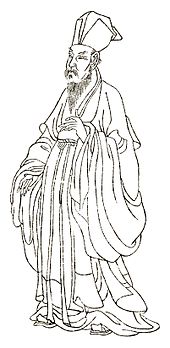ผู้ใช้:Zambo/เสนาฯ หวัง
Zambo/เสนาฯ หวัง | |
|---|---|
 | |
| เกิด | พ.ศ. 1564 |
| เสียชีวิต | 21 พฤษภาคม พ.ศ. 1629 (65 ปี) นครไคฟง มณฑลเหอหนาน |
| สัญชาติ | จีน |
| อาชีพ | อัครมหาเสนาบดี |
| มีชื่อเสียงจาก | ดูในบทความ |
หวังอันฉือ (จีน: 王安石; พินอิน: Wáng Ānshí; เวด-ไจลส์: Wang An-shih; เกิด: พ.ศ. 1564; ตาย: วันที่ 6 เดือน 4 ปีหยวนโหยวที่ 1 ตรงกับวันที่ 21 พฤษภาคม พ.ศ. 1629 ตามปฏิทินสุริยคติ) เป็นข้าราชการชาวจีนในประวัติศาสตร์ มีบทบาทเป็นนักเศรษฐศาสตร์ นักปฏิรูป อัครมหาเสนาบดีซึ่งตรงกับตำแหน่ง "นายกรัฐมนตรี" ในปัจจุบัน และกวีสมัยราชวงศ์ซ่งเหนือยุคเดียวกับเปาบุ้นจิ้น ในประเทศไทยรู้จักกันดีในชื่อ "เสนาฯ หวัง" หรือ "อำมาตย์หวัง" จากละครจีนทางโทรทัศน์เรื่อง "เปาบุ้นจิ้น"
หวังอันฉือมีผลงานโดดเด่นในด้านการปฏิรูปเศรษฐกิจ เขาเล็งเห็นความล้าหลังของสังคมและเป็นผู้นำการปฏิรูปทางเศรษฐกิจสังคม ส่งผลให้การใช้จ่ายของประชาชนคล่องตัว ทำลายการผูกขาดทางการค้า และสร้างระเบียบทางการปกครองและสวัสดิการสังคมรูปแบบใหม่ หวังอันฉือยังปรับปรุงระบบการสอบคัดเลือกบุคคลเข้ารับราชการ โดยขัดขวางคติเห็นแก่ญาติและระบบอุปถัมภ์อันฝังรากลึกในมาแต่เดิม การปฏิรูปของหวังอันฉือไม่เป็นที่พึงใจของกลุ่มอนุรักษนิยมอันนำโดยรัฐมนตรีซือหม่ากวงอย่างยิ่ง นอกจากนี้ สมเด็จพระจักรพรรดิเหรินจงซึ่งมีพระราชอัธยาศัยใฝ่พระราชหฤทัยไปทางซือหม่ากวงก็ไม่โปรดด้วย ทำให้การปฏิรูปดำเนินการและประสบความสำเร็จในช่วงสั้น ๆ เท่านั้น
อัครมหาเสนาบดีหวังมีชีวิตอยู่ในช่วงก่อนกรุงสุโขทัยเมื่อเทียบกันแล้ว
ภูมิหลัง
[แก้]หวังอันฉือนั้นถือกำเนิดในครอบครัวบัณฑิตหลวงทางภาคใต้ของจีน และใน พ.ศ. 1585 ผ่านการสอบคัดเลือกบุคคลเข้ารับราชการได้คะแนนเป็นอันดับสี่ โดยหลังจากสอบผ่านยี่สิบปีแรกได้รับราชการส่วนภูมิภาค ณ มณฑลต่าง ๆ บริเวณน้ำแยงซี ในช่วงนี้หวังอันฉือได้พัฒนาตนและเก็บเกี่ยวประสบการณ์ในการบริหารราชการส่วนภูมิภาคจนปรากฏผลงานโดดเด่น และส่งผลให้เขาเล็งเห็นหนทางแก้ไขสภาพปัญหาของบ้านเมืองที่นับวันยิ่งเสื่อมทรามลงยากจะแก้ไข ปัญหาหลักที่ราชวงศ์ซ่งประสบในครั้งนั้น ได้แก่ การเลี่ยงภาษีของเจ้าของที่ดินอันส่งผลให้ชาวไร่ชาวนาต้องรับภาระแห่งหนี้หนักหน่วงขึ้น ประกอบกับปัญหางบประมาณแผ่นดินขาดดุล และภาวะเงินเฟ้ออย่างกว้างขวาง ยังให้หวังอันฉือซึ่งเป็นคนหัวก้าวหน้าเป็นที่ต้องการของสมเด็จพระจักรพรรดิเจินจงอย่างยิ่ง
การปฏิรูปเศรษฐกิจสังคม
[แก้]
Wang believed that the state has the responsibility to provide for its people the essentials for a decent living standard: "The state should take the entire management of commerce, industry, and agriculture into its own hands, with a view to succoring the working classes and preventing them from being ground into the dust by the rich."[1]
Wang came to power as 2nd privy councilor in 1069[2]. It was there that he introduced and promulgated his reform policy (xin fa 新法). There were three main components to this policy: 1) state finance and trade, 2) defense and social order, and 3) education and improving of governance. Some of the finance reforms included paying cash for labor in place of corvee labor, increase the supply of copper coins, improve management of trade, direct government loan to farmers during planting seasons and to be repaid at harvest. He believed that foundation of the state rests on the well being of the common people. [3] To limit speculation and eliminate private monopolies, he initiated price control and regulated wages and set up pensions for the aged and unemployed. The state also began to institute public orphanages, hospitals, dispensaries, hospices, cemeteries, and reserve granaries.[4]
The military reform centered on a new institution of the baojia system or organized households. This was done to ensure collective responsibility in society and was later used to strengthen local defense. He also proposed the creation of systems to breed military horses, the more efficient manufacture of weapons and training of the militia. [5]
To improve education and government, he sought to break down the barrier between clerical and official careers as well as improving their supervision to prevent connections being used for personal gain. Tests in law, military affairs and medicine were added to the examination system, with mathematics added in 1104. The National Academy was transformed into a real school rather than simply a holding place for officials waiting for appointments. However, there was deep-seated resistance to the education reforms as it hurt bureaucrats coming in under the old system [6]
Modern observers have noted how remarkably close his theories were to modern concepts of the welfare state and planned economy. [ต้องการอ้างอิง]
ความล้มเหลว
[แก้]Although Wang had the alliance of such prominent court figures as Shen Kuo, imperial scholar-officials such as Su Dongpo and Ouyang Xiu bitterly opposed these reforms on the grounds of tradition. They believed Wang's reforms were against the moral fundamentals of the Two Emperors and would therefore prevent the Song from experiencing the prosperity and peace of the ancients. The tide tilted in favor of the conservatives due to renewed foreign conflict. He was even temporarily removed from power and imprisoned in 1075. [ต้องการอ้างอิง]
Like many Chinese officials of the era, Wang's career experienced many ups and downs, but the beginning of the end came in 1074. A famine in northern China drove many farmers off their lands. Their circumstances were made worse by the debts they had incurred from the seasonal loans granted under Wang’s reform initiatives. Local officials insisted on collecting on the loans as the farmers were leaving their land. This crisis was depicted as being Wang’s fault. The empress dowager was also an opponent of Wang. Wang wanted to resign, but the emperor still supported him, giving him high honors and an appointment to Jiangning (present-day Nanjing.)
He was recalled by the emperor the following year, but now he was seen as vulnerable and was openly attacked from groups of conservatives. Wang returned to Nanjing, which he preferred to Kaifeng. He wrote and engaged in scholarship through to his death in 1086. [7]
With Shenzhong's death in 1085, Wang was ousted and the New Policies were rolled back - some temporarily, some permanently.
งานกวีนิพนธ์
[แก้]In addition to his political achievements, Wang Anshi was a noted poet. He wrote poems in the shi form, modelled on those of Du Fu. He was traditionally classed as one of the Eight Great Prose Masters of the Tang and Song (唐宋八大家).
อ้างอิง
[แก้]- ↑ Nourse, Mary A. 1944. A Short History of the Chinese, 3rd edition. P.136
- ↑ http://www.britannica.com/EBchecked/topic/635311/Wang-Anshi
- ↑ [Mote p. 139]
- ↑ Song Dynasty Renaissance 960-1279
- ↑ [Mote p. 140]
- ↑ [Mote p. 141]
- ↑ [Mote p. 141-42]
Mote, F.W. (1999). Imperial China: 900-1800. Harvard University Press. p. 122, 138-142.
ดูเพิ่ม
[แก้]Anderson, Gregory E., "To Change China: A Tale of Three Reformers", Asia Pacific: Perspectives, 1:1 (2001).
| ก่อนหน้า | Zambo/เสนาฯ หวัง | ถัดไป | ||
|---|---|---|---|---|
| to be added | Prime Minister of China (1070–1075) |
to be added | ||
| to be added | Prime Minister of China (1076–1085) |
Sima Guang |
